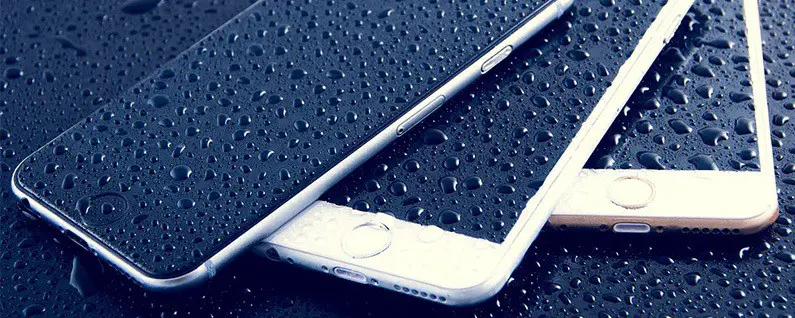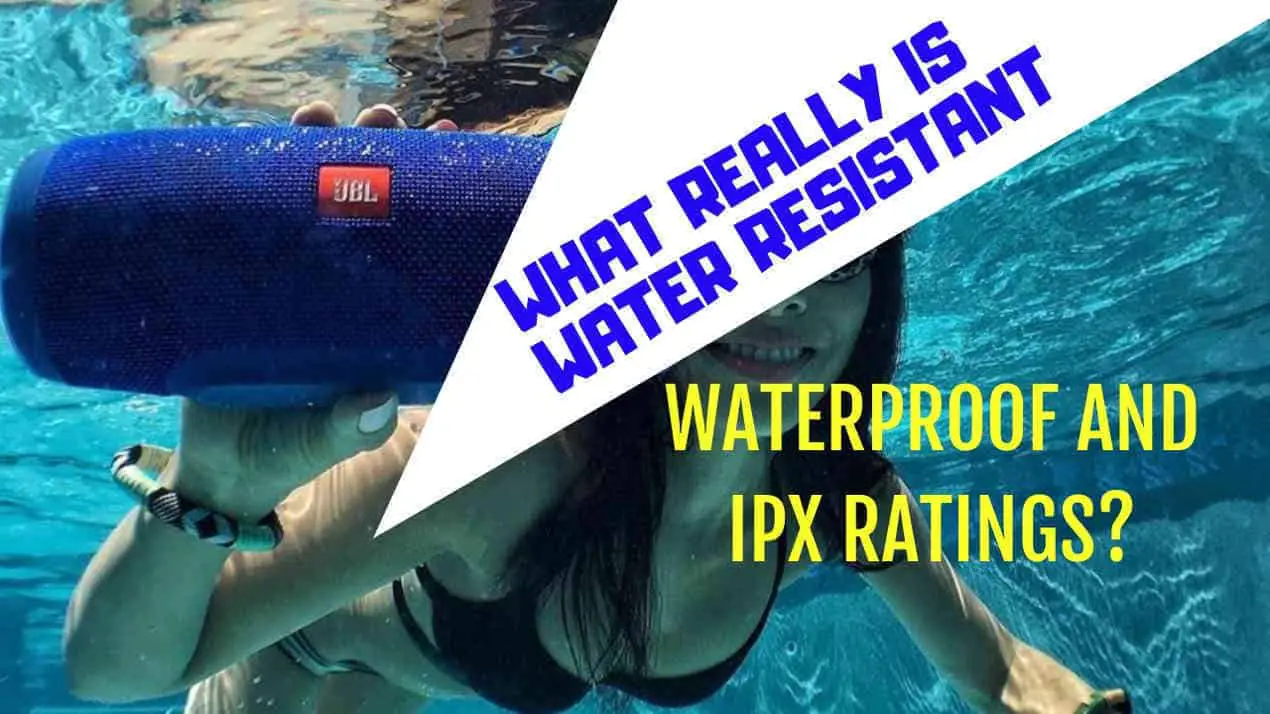You are probably here because you have seen the various terms, water-resistant, waterproof and IPX rating and found them a little confusing and want to know what the difference is. What really is: Water Resistant, Waterproof and IPX Ratings?
IPX Rating basically tells you the level of protection on a device from solids and water in any type of mechanical casing or electrical enclosure. This is why the IP Code; International Protection Marking Standard was created. This code determines a given product level of intrusion protection.
The IP standard was put in place to provide consumers more detailed information than vague marketing terms such as waterproof or my favorite water-resistant.
What really is: Water Resistant, Waterproof and IPX Ratings?
In this post, I hope to clarify the different degrees of waterproofing available on a number of products today. I also will cover dust protection another marketing term used today.
With our increasing smartphone mobile society, there is more wireless portable produces and various accessories available to connect via Bluetooth to your device. Like portable speakers, headphones, microphones and a number of other products. With this mobility going outdoors is inevitable and waterproofing and durability become more of a concern.
In the past a speaker normally sat on a shelf for its life, occasionally getting dusted and played loud on Saturday night. But a day in the life of today’s portable speaker can be much more active. It could start out playing tunes in the shower then tossed into a backpack and used down at the skatepark. Taken on a hike or rafting down a river. No dust being collected on this speaker.
Today’s portable speaker makers have responded to this demand by producing more durable portable speakers with various degrees of durability, waterproofing, and extended battery life.
We have all heard the term water-resistant used and don’t quite understand what that really means. How waterproof is it?
Waterproof and IPX Ratings
Breakdown of the code
| IP | First Digit: Solid Particles Protection | Second Digit: Liquid Protection |
|---|---|---|
| Ingress Protection | The first digit represents protection from solid particles like dust and dirt. | The second number is the amount of water or liquids it can be exposed to. |

IP followed by two digits
- IPX0 – No protection
- IPX1 – Protects from dripping water
- IPX2 – Protects from vertically dripping water
- IPX3 – Protects from sprays up to 60°
- IPX4 – Protects from splashing water, no matter the direction
- IPX5 – Protects from water jets in any direction
- IPX6 – Protects from powerful water jets
- IPX7 – Protects in water up to 3 feet (1 meter)
- IPX8 – Protects when immersed in water over 3 feet
First Digit Code For Solid Particles
| Level Sized | Size Of Particle | Description |
|---|---|---|
| 0 | Zero protection | No protection against contact and entrance of foreign particles. |
| 1 | Particles greater than 50 mm | Any large surface of the body, such as the back of a hand, but no protection against deliberate contact with a body part |
| 2 | Particles greater than 12.5 mm | This protection will keep fingers and small objects out. |
| 3 | Particles greater than 2.5 mm | Protects from tools, thick wires, etc. |
| 4 | Particles greater than 1 mm | Small wires, slender screws, large ants and bugs. |
| 5 | Dust Protected | Keeps out most of the dust but not entirely. Will not allow sufficient quantities to interfere with the operations of the machine. |
| 6 | Dust Tight | No dust will enter the device. Based on 8 hours of testing. |

Second Digit Code For Liquid Protection
| Level | Protection Against | Effective Against | Details |
|---|---|---|---|
| 0 | None | no water protection | – |
| 1 | Dripping Water | Dripping water (vertically falling drops) shall have no harmful effect on the specimen when mounted in an upright position onto a turntable and rotated at 1 RPM. | Test duration: 10 minutes Water equivalent to 1 mm rainfall per minute |
| 2 | Dripping water when tilted at 15 degrees | Vertically dripping water shall have no harmful effect when the enclosure is tilted at an angle of 15° from its normal position. A total of four positions are tested within two axes. | Test duration: 2.5 minutes for every direction of tilt ( 10 minutes total) Water equivalent to 3 mm rainfall per minute. |
| 3 | Spraying water | Water falling as a spray at any angle up to 60° from the vertical shall have no harmful effect, utilizing either: a) an oscillating fixture or b) A spray nozzle with a counterbalanced shield. Test a) is conducted for 5 minutes, then repeated with the specimen rotated horizontally by 90° for the second 5-minute test. Test b) is conducted (with a shield in place) for 5 minutes minimum. | For a spray Nozzle: Test duration: 1 minute per square meter for at least 5 minutes. Water volume: 10 liters per minute Pressure: 50–150 kPa For an oscillating tube: Test duration: 10 minutes Water Volume: 0.07 l/min per hole |
| 4 | Splashing of water | Water splashing against the enclosure from any direction shall have no harmful effect, utilizing either: a) an oscillating fixture or b) A spray nozzle with no shield. Test a) is conducted for 10 minutes. Test b) is conducted (without shield) for 5 minutes minimum. | Oscillating tube: Test duration: 10 minutes, or spray nozzle (same as IPX3 spray nozzle with the shield removed) |
| 5 | Water jets | Water projected by a nozzle (6.3 mm) against enclosure from any direction shall have no harmful effects. | Test duration: 1 minute per square meter for at least 15 minutes Water volume: 12.5 liters per minute Pressure: 30 kPa at distance of 3 m |
| 6 | Powerful water jets | Water projected in powerful jets (12.5 mm nozzle) against the enclosure from any direction shall have no harmful effects. | Test duration: 1 minute per square meter for at least 3 minutes Water volume: 100 liters per minute Pressure: 100 kPa at distance of 3 m |
| 6K | Powerful water jets with increased pressure | Water projected in powerful jets (6.3 mm nozzle) against the enclosure from any direction, under elevated pressure, shall have no harmful effects. Found in DIN 40050, and not IEC 60529. | Test duration: at least 3 minutes Water volume: 75 liters per minute Pressure: 1000 kPa at distance of 3 m |
| 7 | Immersion, up to 1 m depth | Ingress of water in harmful quantity shall not be possible when the enclosure is immersed in water under defined conditions of pressure and time (up to 1 m of submersion). | Test duration: 30 minutes – ref IEC 60529, table 8. Tested with the lowest point of the enclosure 1000 mm below the surface of the water, or the highest point 150 mm below the surface, whichever is deeper. |
| 8 | Immersion, 1 m or more depth | The equipment is suitable for continuous immersion in water under conditions which shall be specified by the manufacturer. However, with certain types of equipment, it can mean that water can enter but only in such a manner that it produces no harmful effects. The test depth and duration is expected to be greater than the requirements for IPx7, and other environmental effects may be added, such as temperature cycling before immersion. | Test duration: Agreement with Manufacturer Depth specified by the manufacturer, generally up to 3 m |
| 9K | Powerful high-temperature water jets | Protected against close-range high pressure, high-temperature spray downs. Smaller specimens rotate slowly on a turntable, from 4 specific angles. Larger specimens are mounted upright, no turntable required, and are tested freehand for at least 3 minutes at a distance of 0.15–0.2 m. There are specific requirements for the nozzle used for the testing. This test is identified as IPx9 in IEC 60529. | Test duration: 30 seconds in each of 4 angles (2 minutes total) Water volume: 14–16 liters per minute Pressure: 8–10 MPa (80–100 bar) at a distance of 0.10–0.15 m Water temperature: 80 °C |
IP Code Reference info from Wikipedia
What Is An IP Rating
Reviews on the latest in waterproof wireless speaker technology
- JBL Charge 3 Waterproof Speaker Review
- JBL Xtreme 2 Waterproof Speaker Review
- Top 10 Latest Wireless Speaker For 2017
- UE Boom 2 Waterproof Bluetooth Speaker Review
See More: Do you need a media streaming device with a Smart TV?


